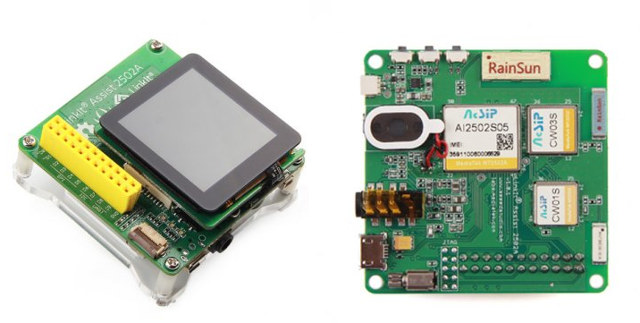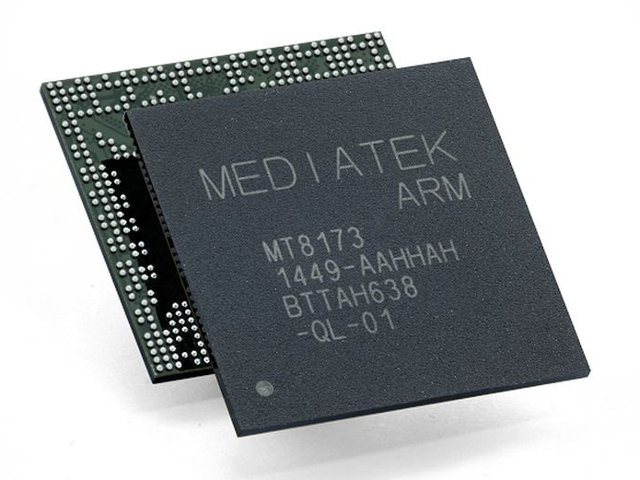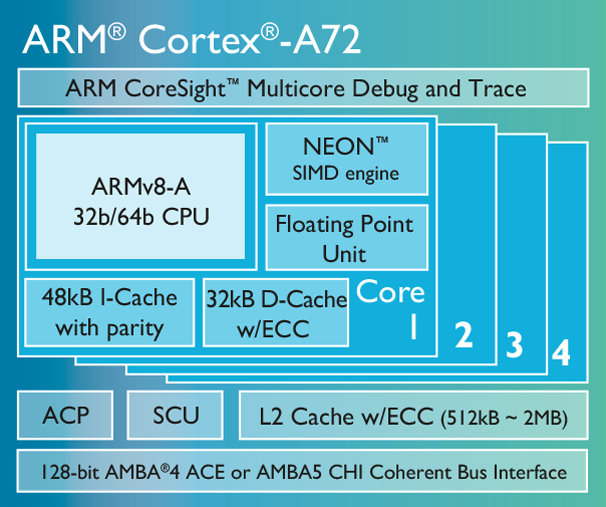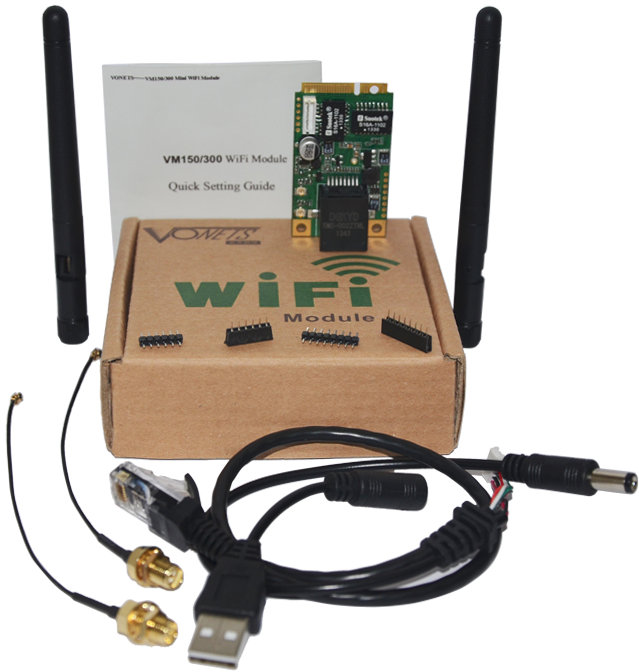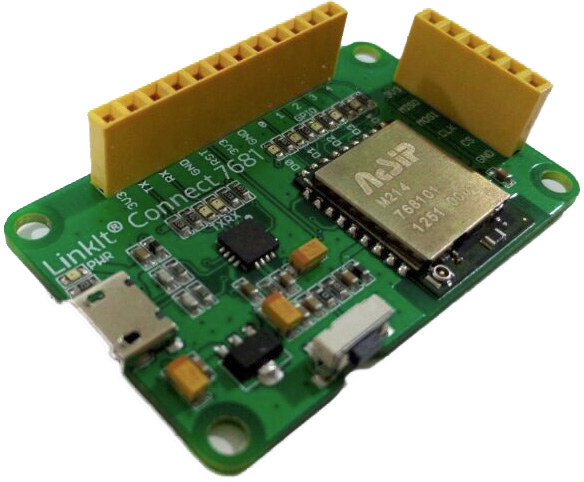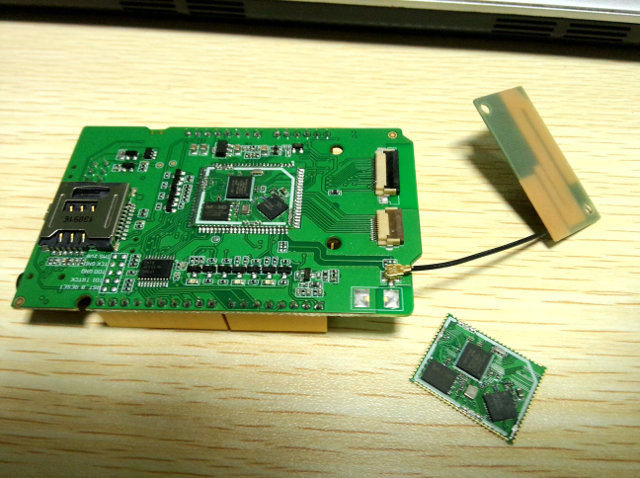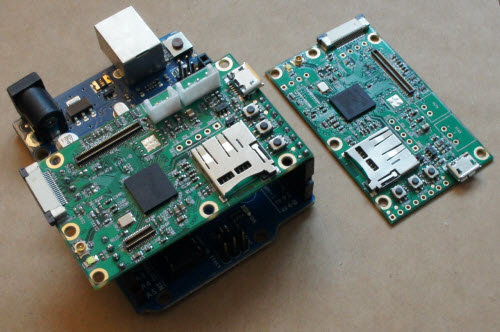After LinkIt ONE, Mediatek Labs has introduced a new IoT development kit based on their Aster M2502 ARM7 processor with LinkIt Assist 2502 comprised of AcSiP MT2502A IoT SiP Core module, a 802.11b/g/n module, a GNSS module, and an exchangeable 240×240 16-bit color capacitive touch LCM Board. The AcSiP module can also be purchased separately, so you could use LinkIt Assist 2502 board for early development, because moving to your custom hardware based on AcSiP MT2502A module. LinkIt Assist 2502A specifications: MCU – AcSiP AI2502S05 module with MT2502A (Aster) ARM7 EJ-STM processor @ 260MHz, 4MB RAM, 16MB flash Display – 240×240 LCD module; 16-bit color depth; transflective; based on ST7789S driver IC. Connectivity Wi-Fi 802.11 b/g/n via AcSiP CW01S module based on MT5931 SoC Bluetooth 2.1 SPP and 4.0 GATT dual mode (part of MT2502A) GPS via AcSiP CW03S module based on MT3332 chip supporting GPS, GLONASS, and BeiDou. GSM […]
Mediatek MT8173 is a big.LITTLE Cortex A72 / A53 Quad Core Processor for Tablets
Mediatek MT8173 first showed up in the Linux kernel as a quad core Cortex A57 / A53 processor, but now that Mediatek has officially announced the processor, it turns out the Cortex A57 cores are actually the new Cortex A72 cores, with a similar architecture, but more powerful, about 1.8 times faster. Key features listed by the company: Processor – Heterogeneous 64-bit Multi-Core big.LITTLE architecture up to 2.4GHz featuring ARM Cortex-A72 and ARM Cortex-A53 64-bit CPU. Big cores and LITTLE cores can run at full speed at the same time for peak performance requirement GPU – Imagination PowerVR GX6250 GPU with support for OpenGL ES 3.1, OpenCL. Performance: 350Mtri/s and 2.8 Gpix/s. Display Support WQXGA display (2560×1600) up to 60 Hz with TV-grade picture quality enhancement. Up to 120 Hz mobile display for other resolutions. HDMI and Miracast support for multi-screen applications Video – Ultra HD 30fps H.264/HEVC(10-bit)/VP9 hardware video […]
Linux 3.19 Release – Main Changes, ARM and MIPS Architectures
Linus Torvalds released Linux Kernel 3.19 yesterday: So nothing all that exciting happened, and while I was tempted a couple of times to do an rc8, there really wasn’t any reason for it. Just as an example, Sasha Levin used KASan and found an interesting bug in paravirtualized spinlocks, but realistically it’s been around forever, and it’s not even clear that it can really ever trigger in practice. We’ll get it fixed, and mark it for stable, and tempting as it was, it wasn’t really a reason to delay 3.19. And the actual fixes that went in (see appended shortlog) were all fairly small, with the exception of some medium-sized infiniband changes that were all reverting code that just wasn’t ready. So it’s out there – go and get it. And as a result, the merge window for 3.20 is obviously also now open. Linus Linux 3.18 improved performance of […]
ARM Unveils Cortex A72 Processor and Mali-T880 GPU
ARM has just announced their new Cortex A72 ARMv8 core with 3.5 times the performance of Cortex A15 ARMv7 cores, together with Mali-T880 GPU delivering 1.8 times the performance of Mali-T760, and CoreLink CCI-500 Cache Coherent Interconnect to link the new CPU, GPU and I/Os together. ARM Cortex A72 Some of the key features of the new core include: Architecture – ARMv8-A Multicore – 1-4x SMP within a single processor cluster, and multiple coherent SMP processor clusters through AMBA 5 CHI or AMBA 4 ACE technology ISA Support AArch32 for full backward compatibility with ARMv7 AArch64 for 64-bit support and new architectural features TrustZone security technology NEON Advanced SIMD DSP & SIMD extensions VFPv4 Floating point Hardware virtualization support Cache – 48KB I-cache, 32KB D-cache, and 512 KB to 2MB L2 cache with ECC Debug & Trace – CoreSight DK-A57 Process – 16nm FinFET A cluster can support up to […]
Vonets VM300 Wi-Fi & Ethernet IoT Board with Mediatek MT7620 Runs OpenWRT
Mediatek MT760 is a recent Wi-Fi SoC found in some Nexx WT3020 routers, and WRTnode development board. Both run OpenWRT and costs $17 to $30 depending on the amount of flash, and ports with the former featuring two Ethernet ports, and the latter access to GPIOs. You could probably open the case of the Nexx routers and solder some wires to get access to GPIO, and you can hack an Ethernet cable for WRTnode, but another options could be Vonets WM300 kit that includes a board with Wi-Fi and Ethernet, a cable for USB / Ethernet connection, headers for GPIOs, and two external antennas for less than $30. An OpenWRT SDK is also provided for the kit. Specifications listed for VM300 board: Processor – Mediatek MT7260N MIPS processor @ 580MHz Storage – 4MB SPI Flash (option: 8MB/16MB) for firmware System Memory – 32MB or 64MB SDRAM Connectivity Wi-Fi Single band […]
LinkIt Connect 7681 is a Wi-Fi IoT Board Powered by Mediatek MT7681
So it looks like Mediatek has decided to carry on with its Mediatek Labs endeavours, as after launching LinkIt ONE last year, they’re about to introduce LinkIT Connect 7681, a development board with a Mediatek MT7681 based Wi-Fi module, and access to various GPIOs. LinkIt Connect 7681 HDK (Hardware Development Kit) specifications: SoC – Mediatek MT7681 Andes N9 processor @ 80 MHz with 64KB RAM, Storage – 1MB SPI Flash for firmware Connectivity – Wi-Fi: 802.11 b/g/n for Station mode; 802.11 b/g for AP mode via a MT7681 module by AcSIP Headers – 12-pin header for UART, 5 GPIOs (also usable as software PWM), RESET, and 3.3V/5V/GND; 6-pin header for SPI, 3.3V and GND. USB – 1x micro USB for power and programming/debugging Misc – Reset push-button, 2x UART LEDs Power Supply – On-board 1A 3.3V voltage regulator (can be powered from USB connector) I/O Voltage – 3.3V for GPIO […]
LinkIt A-Core Packs Mediatek MT2502A SoC into a Tiny Module for Wearables
LinkIt ONE is a development board based on Meditak MT2502A SoC for wearables, and developed by SeeedStudio. With GPS, Wi-Fi, and GSM/GPRS connectivity, and a LiPo battery, it’s great to experiment IoT or wearable applications, but if you plan to launch an actual product, it could be nice to have a module, and built a baseboard around it. That’s exactly what SeeedStudio is working with LinkIt A-Core module. LinkIT A-Core module specifications: SoC – Mediatek MT2502AV ARM7 SoC @ 260 MHz with 32MB PSRAM and 32MB Flash on-chip. External Storage – 16M external Flash (MX25U12835F) Cellular Connectivity – GSM/GPRS quad-band 850/900/1800/1900MHz with RF7198 RF transmitter. Connectivity – Bluetooth 2.0 / 2.0 EDR / 4.0, GPS compatible GPS/GNSS (requires external GPS module) Expansion – 48 general purpose digital I/O Power supply: DC 3V~4.2V Power Consumption – > 3mA Dimensions – 19x23x2 mm The module is still in development, and the company welcomes […]
Fernvale Open Source Hardware IoT Board Based on Mediatek MT6260 SoC with GSM Connectivity
Andrew Huang (Bunnie), an hardware engineer, known for hacking the original XBOX, and more recently for Novena open source laptop, has decided it could be interesting to reverse-engineer Mediatek MT6260 processor, as in China, it’s difficult to get documentation, SDK, and tools if you don’t commit to purchase X chips, where X is a rather large number. He and others also checked whether their work could be open sourced legally, and assert their “fair use” rights to reverse-engineer hardware and firmware. And so Fernvale project was born both as a technical challenge and to make a point. MT6260 is a $3 ARM7EJ-S processor clocked at 364 MHz with 8MB built-in RAM, interfaces such as I2C, SPI, PWM, UART, as well as LCD and touchscheen controller, and audio codec, battery charger, USB, Bluetooth, and GSM support, which make the $6 Atmel MCU used in Arduino board look expensive. The main differences […]


